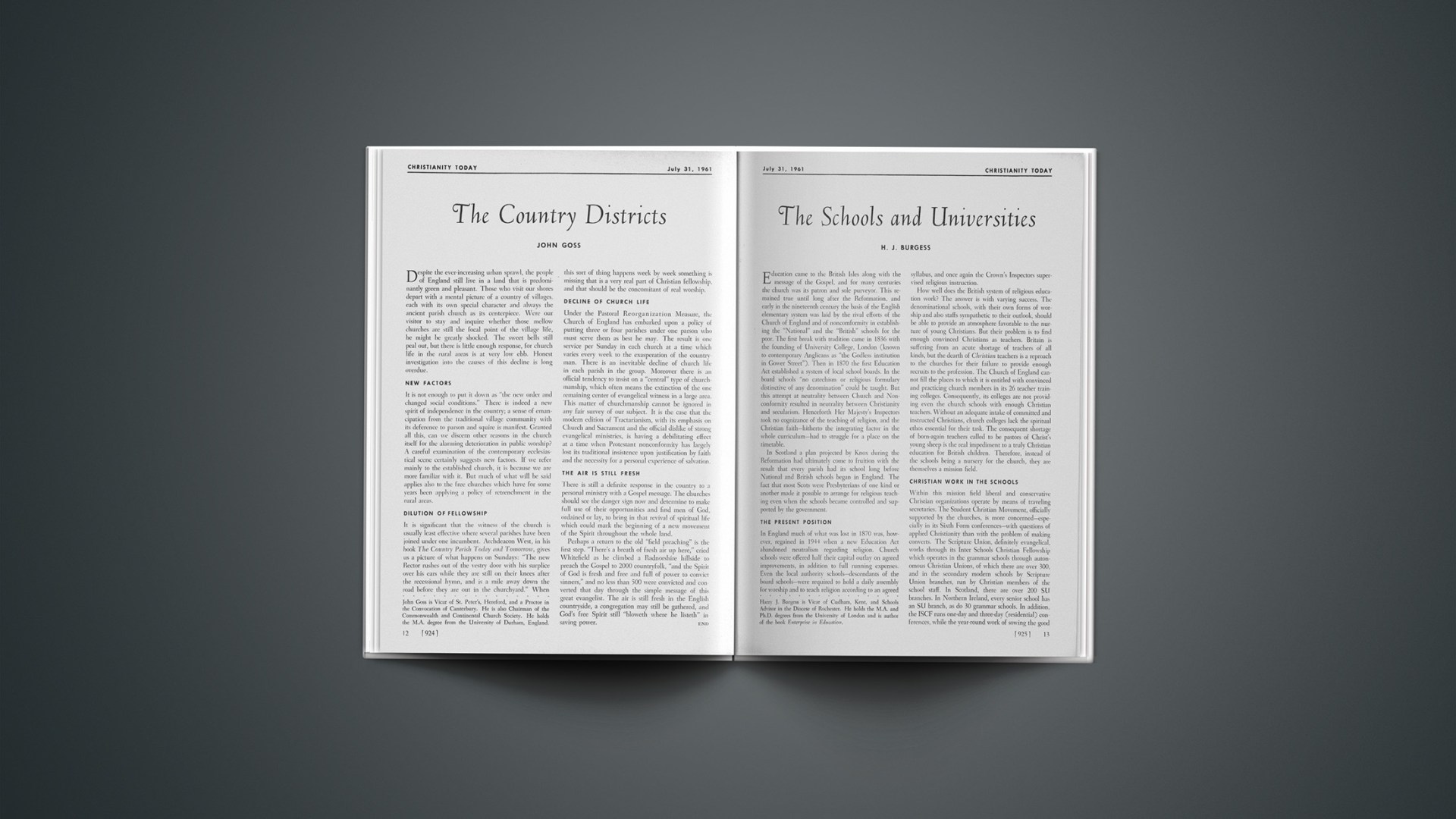Despite the ever-increasing urban sprawl, the people of England still live in a land that is predominantly green and pleasant. Those who visit our shores depart with a mental picture of a country of villages. each with its own special character and always the ancient parish church as its centerpiece. Were our visitor to stay and inquire whether those mellow churches are still the focal point of the village life, he might be greatly shocked. The sweet bells still peal out, but there is little enough response, for church life in the rural areas is at very low ebb. Honest investigation into the causes of this decline is long overdue.
NEW FACTORS
It is not enough to put it down as “the new order and changed social conditions.” There is indeed a new spirit of independence in the country; a sense of emancipation from the traditional village community with its deference to parson and squire is manifest. Granted all this, can we discern other reasons in the church itself for the alarming deterioration in public worship? A careful examination of the contemporary ecclesiastical scene certainly suggests new factors. If we refer mainly to the established church, it is because we are more familiar with it. But much of what will be said applies also to the free churches which have for some years been applying a policy of retrenchment in the rural areas.
DILUTION OF FELLOWSHIP
It is significant that the witness of the church is usually least effective where several parishes have been joined under one incumbent. Archdeacon West, in his book The Country Parish Today and Tomorrow, gives us a picture of what happens on Sundays: “The new Rector rushes out of the vestry door with his surplice over his ears while they are still on their knees after the recessional hymn, and is a mile away down the road before they are out in the churchyard.” When this sort of thing happens week by week something is missing that is a very real part of Christian fellowship, and that should be the concomitant of real worship.
DECLINE OF CHURCH LIFE
Under the Pastoral Reorganization Measure, the Church of England has embarked upon a policy of putting three or four parishes under one parson who must serve them as best he may. The result is one service per Sunday in each church at a time which varies every week to the exasperation of the country man. There is an inevitable decline of church life in each parish in the group. Moreover there is an official tendency to insist on a “central” type of churchmanship, which often means the extinction of the one remaining center of evangelical witness in a large area. This matter of churchmanship cannot be ignored in any fair survey of our subject. It is the case that the modern edition of Tractarianism, with its emphasis on Church and Sacrament and the official dislike of strong evangelical ministries, is having a debilitating effect at a time when Protestant nonconformity has largely lost its traditional insistence upon justification by faith and the necessity for a personal experience of salvation.
THE AIR IS STILL FRESH
There is still a definite response in the country to a personal ministry with a Gospel message. The churches should see the danger sign now and determine to make full use of their opportunities and find men of God, ordained or lay, to bring in that revival of spiritual life which could mark the beginning of a new movement of the Spirit throughout the whole land.
Perhaps a return to the old “field preaching” is the first step. “There’s a breath of fresh air up here,” cried Whitefield as he climbed a Radnorshire hillside to preach the Gospel to 2000 countryfolk, “and the Spirit of God is fresh and free and full of power to convict sinners,” and no less than 500 were convicted and converted that day through the simple message of this great evangelist. The air is still fresh in the English countryside, a congregation may still be gathered, and God’s free Spirit still “bloweth where he listeth” in saving power.
Samuel M. Shoemaker is the author of a number of popular books and the gifted Rector of Calvary Episcopal Church in Pittsburgh. He is known for his effective leadership of laymen and his deeply spiritual approach to all vital issues.










